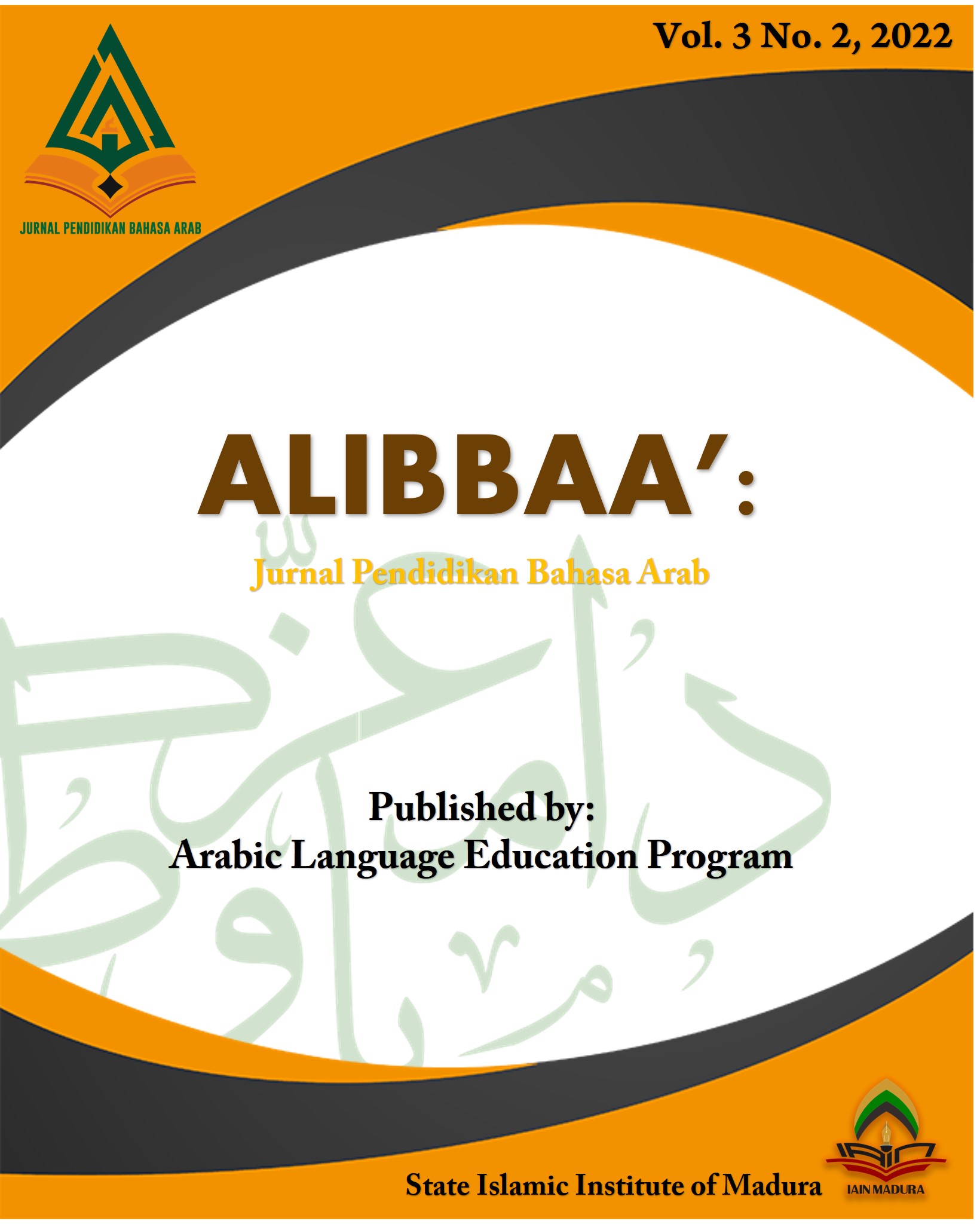Learning Arabic Language Skills for Adults (Jack C. Richard Thought Review)
 Abstract views: 765
,
Abstract views: 765
,
 pdf downloads: 408
pdf downloads: 408
Abstract
Richards' thoughts on language learning are indeed very interesting to study. According to Richard on receptive language skills, there are three methods: Oral Approach and Situational Language Teaching, Audiolingual Method and The Silent Way. The approach of this study is literature from several sources related to the relevant discussion. The author uses the text study method in analyzing the collected data with the aim of describing the content clearly and in detail and aiming to reveal the concept of Jack C. Richard's thinking in learning receptive language skills and knowing the right receptive learning concept in learning receptive Arabic skills in adult education. The results of this study found that Jack C Richard's thoughts can be applied to adult education, especially in learning receptive Arabic skills by adjusting the conditions and situations that exist in the material and adult learners.
Downloads
References
Acep Hermawan. Metodologi Pembelajaran Bahasa Arab. Bandung: PT Remaja Rosdakarya, 2018.
Alfurqan et. al. “Pendidikan Orang Dewasa Yang Dikembangkan Rasullullah.” Islam Transformatif: Journal of Islamic Studies 1, no. 1 (2017): 15–29.
Ety Nur Inah. “Peranan Komunikasi Dalam Pendidikan.” Al-Ta’dib: Jurnal Kajian Ilmu Kependidikan 6, no. 1 (2013): 176–88. http://dx.doi.org/10.31332/atdb.v6i1.299.
Halim K. Malik. “Teori Belajar Andragogi Dan Aplikasinya Dalam Pembelajaran.” Inovasi 5, no. 2 (2008): 1–16. https://ejurnal.ung.ac.id/index.php/JIN/article/view/803.
Imroatus Sholikhah. “Paradigma Baru Pembelajaran Bahasa Dan Resistensi Masyarakat Terhadap Perubahan.” Cendekia 8, no. 2 (2014): 151–68. https://doi.org/10.30957/cendekia.v8i2.60.
Izzuddin Mustafa dan Acep Hermawan. Metodologi Penelitian Bahasa Arab: Konsep Dasar, Strategi, Metode, Teknik. Bandung: PT Remaja Rosdakarya, 2018.
Jack C. Richards & Theodore S. Rodgers. Approaches and Methods in Language Teaching. New York: Cambridge University Press, 2001.
Khairani et al. “Peran, Fungsi, Dan Kedudukan Bahasa Dalam Kehidupan Sehari-Hari.” Universitas Jenderal Achmad Yani, 2018. https://repository.unja.ac.id/6452/.
Kisno Umbar. “Pembelajaran Keterampilan Berbahasa Arab Reseptif (Telaah Perbandingan Pemikiran Ibrahim Abdul Alim Dan Jack C. Richards).” Arabia: Jurnal Pendidikan Bahasa Arab 11, no. 1 (2019): 111–13. https://journal.iainkudus.ac.id/index.php/Arabia.
Lady Farah Aziza dan Ariadi Muliansyah. “Keterampilan Berbahasa Arab Dengan Pendekatan Komprehensif.” El-Tsaqafah: Jurnal Jurusan Pendidikan Bahasa Arab 19, no. 1 (2020): 56–71. https://journal.uinmataram.ac.id/index.php/eltsaqafah/article/download/2344/1237.
Muspika Hendri. “Pembelajaran Keterampilan Berbicara Bahasa Arab Melalui Pendekatan Komunikatif.” POTENSIA: Jurnal Kependidikan Islam 3, no. 2 (2017): 196–210.
Noermanzah. “Bahasa Sebagai Alat Komunikasi, Citra Pikiran, Dan Kepribadian,” 306–19. Universitas Bengkulu: Ejournal UNIB, 2019. https://ejournal.unib.ac.id/index.php/semiba/article/view/11151.
R. Umi Baroroh dan Fauziyah Nur Rahmawati. “Metode-Metode Dalam Pembelajaran Keterampilan Bahasa Arab Reseptif.” Urwatul Wutsqo: Jurnal Studi Kependidikan Dan Keislaman 9, no. 2 (2020): 179–96. https://doi.org/10.54437/urwatulwutsqo.v9i2.181.
Rini Novianti Yusuf et. al. “Implikasi Asumsi Konsep Diri Dalam Pembelajaran Orang Dewasa.” Edukatif: Jurnal Ilmu Pendidikan 3, no. 4 (2021): 1144–51. https://doi.org/10.31004/edukatif.v3i4.513.
Supardi. “Model Pembelajaran Bahasa Arab Terpadu Di Perguruan Tinggi Keagamaan Islam Negeri.” Lisania: Journal of Arabic Education and Literature 2, no. 1 (2018): 13–27. https://lisania.iainsalatiga.ac.id/index.php/lisania/.
Sutrisno Hadi. Metodologi Research. Yogyakarta: Fakultas Psikologi UGM, 1990.
Syahrin Harahap. Metodologi Studi Dan Penelitian Ilmu-Ilmu Ushuluddin. Jakarta: Rajawali Pers, 1995.
Yanti Nurdiyanti dan Ai Hilyatul Halimah. “Motivasi Pendidikan Orang Dewasa.” JEKPEND: Jurnal Ekonomi Dan Pendidikan 3, no. 2 (2020): 9–14.
Yusminar Yusri. “Strategi Pembelajaran Andragogi.” Al-Fikra: Jurnal Ilmiah Keislaman 12, no. 1 (2013): 25–52. http://dx.doi.org/10.24014/af.v12i1.3861.
Zainal Rafli dan Ninuk Lustyantie. Teori Pembelajaran Bahasa, Editor, Cet. II. Yogyakarta: Penerbit Garudhawaca, 2016.
Http://Www.Sil.Org/Lingualinks, n.d.
Authors who publish with this journal agree to the following terms:
a. Authors retain copyright and grant the journal right of first publication with the work simultaneously licensed under a Creative Commons Attribution License that allows others to share the work with an acknowledgement of the work's authorship and initial publication in this journal.
b. Authors are able to enter into separate, additional contractual arrangements for the non-exclusive distribution of the journal's published version of the work (e.g., post it to an institutional repository or publish it in a book), with an acknowledgement of its initial publication in this journal.
c. Authors are permitted and encouraged to post their work online (e.g., in institutional repositories or on their website) prior to and during the submission process, as it can lead to productive exchanges, as well as earlier and greater citation of published work (See The Effect of Open Access).
Alibbaa': Jurnal Pendidikan Bahasa Arab have CC-BY-SA or an equivalent license as the optimal license for the publication, distribution, use, and reuse of scholarly work.
In developing strategy and setting priorities, Alibbaa': Jurnal Pendidikan Bahasa Arab recognize that free access is better than priced access, libre access is better than free access, and libre under CC-BY-SA or the equivalent is better than libre under more restrictive open licenses. We should achieve what we can when we can. We should not delay achieving free in order to achieve libre, and we should not stop with free when we can achieve libre.

Alibbaa': Jurnal Pendidikan Bahasa Arab is licensed under a Creative Commons Attribution 4.0 International License
You are free to:
- Share — copy and redistribute the material in any medium or format
- Adapt — remix, transform, and build upon the material for any purpose, even commercially.
- The licensor cannot revoke these freedoms as long as you follow the license terms.











